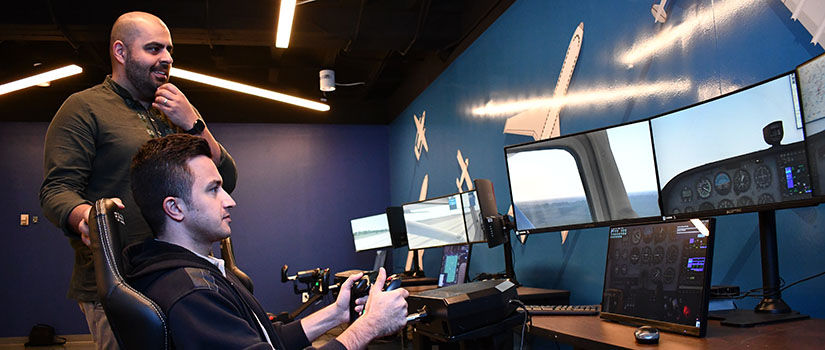How do planes fly? It is a simple, yet complicated question. The physics of flight is not trivial, and it can be difficult to explain the effect of forces on an aircraft.
Instructor Mostafa Mobli was intrigued about how planes fly, leading him to explore aerospace engineering, a specialized field of mechanical engineering, during his graduate studies at the University of South Carolina. Now, Mobli is committed to not only sharing his knowledge with students but accompanying them on their undergraduate journey.
Mobli’s interest in mechanical engineering in his native Iran was developed differently than students in the U.S. Prior to attending college, he took an entrance exam and was ranked based on his performance. Students chose a discipline based on their rank on the exam and for Mobli, his options were mechanical engineering, electrical engineering and computer science.
“Mechanical engineering is the broadest field, which includes aspects of electrical and chemical engineering and basic physics. It piqued my interest because you don't really see this diverse range of topics in other engineering fields,” Mobli says.
After earning his undergraduate degree from the University of Tehran, Mobli came to the U.S. and initially started his graduate studies at Stony Brook University in New York. But he found Mechanical Engineering Professor Tanvir Farouk’s work with plasma science at USC and immediately became interested. He applied to USC and arrived in January 2013. In the last 10 years, Mobli has earned his master’s degree and Ph.D. in mechanical engineering and started in his current position as instructor and undergraduate lab director in 2019.
Mobli has taught 11 mechanical and aerospace engineering classes at the College of Engineering and Computing. Teaching is his passion, and it was always his intention to pursue a career in academia. Mobli particularly enjoys seeing a student come to his class with limited or no knowledge of a topic. But he answers students’ questions and works with them while their knowledge increases.
“With aerospace engineering students specifically, I get to see them grow and their personality changes because I’m with them throughout their undergraduate education. Helping a student and seeing them grow by learning different topics and find and follow their passion is a very satisfying experience,” Mobli says.
Mobli also finds it gratifying to mentor a student who may feel overwhelmed with engineering studies and guide them along their educational journey.
“Helping students is an important part of being an instructor in general. When I sit down with my students, they bring me their problems, and I try to help them. This is also a joyful experience,” Mobli says.
While Mobli enjoys mentoring students, he considers mechanical engineering professors Tanvir Farouk and Chen Li as his mentors. He worked with Farouk during his master’s studies, and Li was his Ph.D. advisor.
“Both of them have been important mentors to me,” Mobli says. “Dr. Farouk is the person who taught me how to do research, and I'm a computational person because of him. Dr. Li played a very important role because he was Ph.D. advisor. I have my degrees because of them.”
“It impresses me the most to see the joy he finds in carrying out his responsibilities and the sparkle in his eyes when he recounts his student successes,” Farouk says.
Mobli has also been involved with the college’s undergraduate aerospace engineering program since its inception with four students in 2018. Three years later, the program increased to 150 students and as the state’s only aerospace engineering undergraduate program, more students are expected to enroll and help fill the need for interns and professionals in South Carolina.
“One of the problems that Boeing has in South Carolina is that there are not enough local students and aerospace engineers to hire. It's important to deliver good engineers who are knowledgeable, motivated and passionate,” Mobli says.
Aside from teaching, Mobli also serves as the undergraduate lab manager for all the facilities in the 300 Main St. building. This includes Federal Aviation Administration-certified flight simulators, which were moved from the McNair Center last year. Mobli says that the simulators have been instrumental in having aerospace engineering students apply classroom theory through hands on experience.
“After we teach theory, the students use the flight simulator since the theory is fresh in their mind,” Mobli says. “They fly with important scenarios such as how forces change the way they control the plane. We need to make sure that when students graduate, they are familiar with all the instrumentation and experimentation tools and computer simulation methods.”
Mobli looks forward to continuing teaching future mechanical and aerospace engineering professionals, while motivating and encouraging STEM education.
“With social media and advances in technology, we need to keep students motivated and engaged so they come to class ready to learn,” Mobli says. “You can't force them to learn; you must work with them. The only way to do that is to keep them motivated and reignite their passion.”
